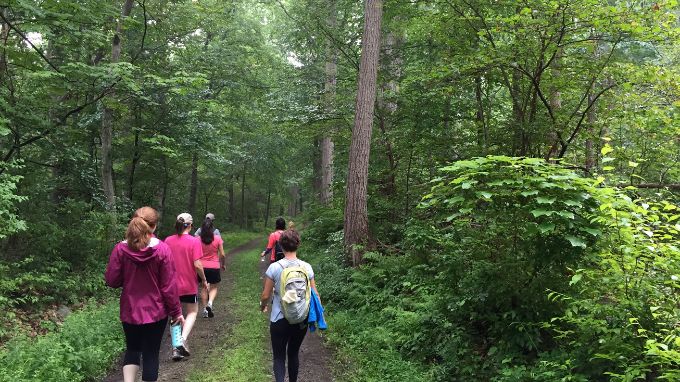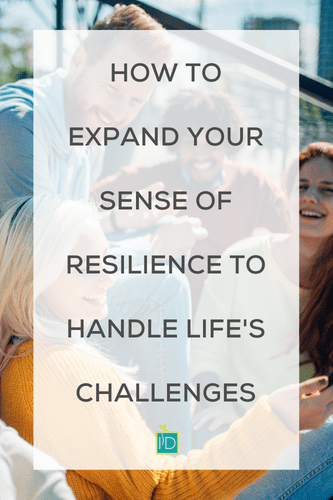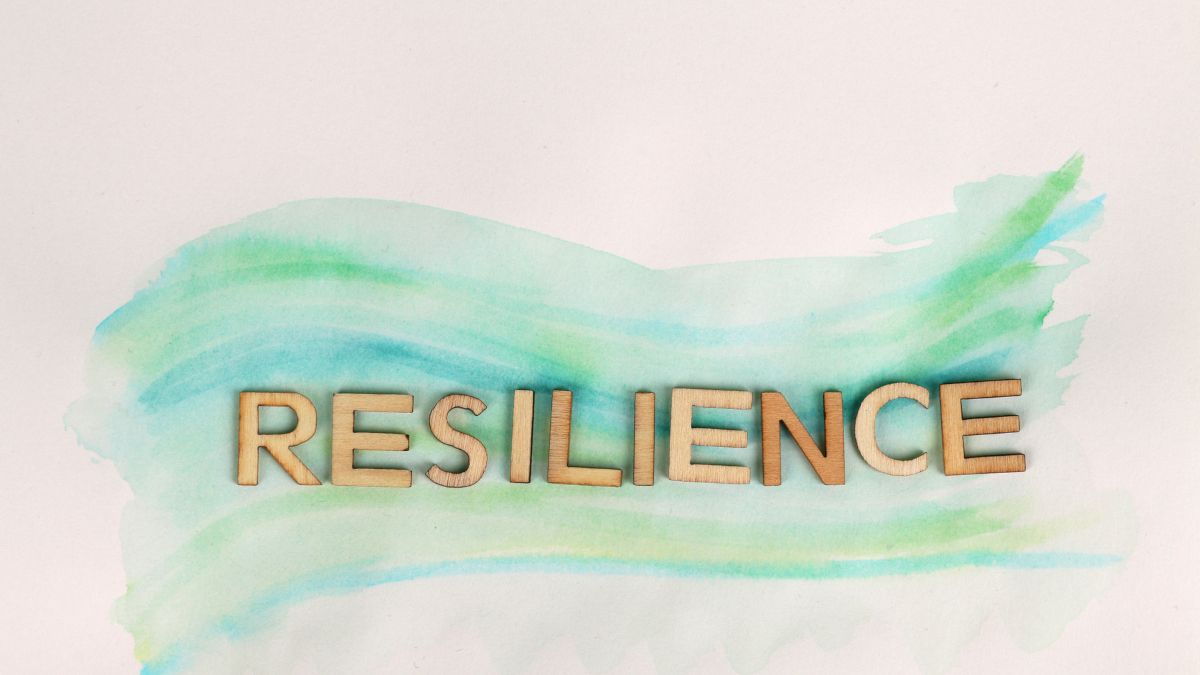I love the word resilient.
It is often defined as the ability to “bounce back” from a difficult situation. But I know that for some, especially in our military community, it is an overused word that carries with it an expectation, a label, or something that must be proven by how we handle hardship. I get that.
After living the military life for the past 17 years, I believe I understand what we’re signed up for as a family. We have endured many separations, but it doesn’t ever seem to get easier. Just as we feel like we’ve got things figured out, we’re given another hurdle. However, I have been able to gain a greater understanding as to how I can support and enhance my resilience. These mechanisms have kept me more grounded and allowed me to continue moving forward as the best version of myself. Or, at least the best version of myself that I could find at the time.

In February 2022, when I was feeling super resilient and ready for the year ahead, my husband got orders for an unexpected, no-notice deployment. All of my plans for our family seemed to be stolen from me. And as much as I’d love to say I thrive in spontaneity, I’ve learned through seven military deployments that I need copious amounts of time to mentally prepare. The military (love it or not) is really good about putting us in situations where we are asked to be resilient. We are handed stressful challenges and are expected to move forward, but during this last deployment, I didn’t want to move forward. I didn’t want to be resilient. All I wanted was for my husband to be here and for our family to be whole.
Does this sound familiar?
LEARNING RESILIENCE THROUGH STRESS INOCULATION
There are some individuals who, by either nature or nurture, already have the tools to manage and tame stress as it’s given. Regardless of whether or not you have these tools, there is always more that can be learned when working to meet difficulties and life’s demands head-on.
In her recent New York Times article, Tara Parker-Pope explains that one way to manage stress is to practice it. Another name for this is stress inoculation. It’s a method of slowly introducing things into your life that push you out of your comfort zone and challenge you. Medical professors Steven Southwick and Dennis Charney conducted research at the intersection of psychiatry, resilience, and PTSD. One such study, published in Scientific American, shows that by taking on difficult or uncomfortable tasks and progressively increasing the degree of difficulty or exposure, you can increase your ability to handle increasingly higher amounts of stress over time. This “graded exposure” can cover a broad range of activities to promote physical, emotional, and cognitive resilience. It can look like training for a race, climbing a mountain, exploring your new neighborhood, or going to a social function that you wouldn’t normally feel comfortable attending. All of these challenges can advance our capacity to handle life’s biggest situations.
COMBATING STRESS THROUGH MOVEMENT AND THE OUTDOORS
The physical task of completing an exercise is two-fold in developing resilience: Not only does it assist in stress inoculation, but it also increases the release of endorphins and neurotransmitters that help us combat depression, anxiety, and fatigue. Over time, this will slow the release of the stress hormone, cortisol. When we move, we feel better, and when we feel better, we’re more prepared to handle life’s stressors. I believe this is one of life’s most beautiful, positive feedback loops!
Whether your activity of choice is walking with friends, lifting weights, or running, it’s good to consider what brings you joy. I have found that my joy resides in getting into nature for exercise. The simple act of walking out your door to the outdoors can provide numerous benefits, such as reducing feelings of stress, lowering anxiety, and improving mental clarity. Nature has an amazing way of helping us even when we didn’t know we needed the help.

This green exercise is defined as any form of physical activity that takes place in a green space. When we’re in nature we begin to shift focus away from our problems and begin to see the world through a different lens. Our attention is held with little or no effort being expended. This “soft fascination” is explained through Kaplan and Kaplan’s Attention Restoration Theory (or ART), which suggests that being in a safe, natural environment can restore fatigue and provide us with renewed energy. Without thought, our problems don’t seem as big as before and our thinking brain relaxes into the observing brain. While a walk inside on a treadmill is great physical activity, taking that same walk and doing it outside can widen our view and create “optic flow.” Neuroscientist and Stanford University professor Andrew Huberman goes into great detail in his Huberman Lab Podcast (Episode 28) regarding specific scientific studies that demonstrate how this visual movement, or flow, helps quiet the part of the brain that is responsible for anxiety, fear, and threat. This combination of stress inoculation through exercise and the many benefits of nature provides more tools to strengthen our resilience.
GAINING RESILIENCE THROUGH STRENGTH IN COMMUNITY
In addition to movement and nature connection, I have found that one of the most fulfilling ways to combat stress and gain resilience is through community and social engagement. The probability of PCSing to a new location every few years is high in this occupation. And with each move comes the inevitability of meeting new people – a sometimes uncomfortable process, but one in which we can find strength. It has always amazed me how quickly a neighbor can become a friend, and in some circumstances, how quickly friends become like family. These are the people that know what you’re going through. They’re able to see through your “I’m fine” responses. They understand why you break into tears when they simply ask how you’re doing. They know because they are walking this same path right along with you. While hindsight isn’t always 20/20, looking back at where we’ve been and how life has unfolded can give us insight into not only what we have endured, but also what we have gained from our trials. Abundant research conveys the importance of social ties for both mental and physical health and wellbeing. In fact, social ties can have a direct impact on both morbidity and mortality. While that may seem pretty serious, if you consider how we’ve evolved as a communal species, it makes sense.

The proverbial “hill or mountain” we have to climb in the face of a life challenge, was actually tested in a study regarding the importance of social support. Those who had a friend by their side when given the uncomfortable task of carrying a heavy load up a hill didn’t grade the hill as steep with a friend by their side. There is strength in community, and this lesson is as old as scripture (Ecclesiastes 4:9-12). There are times when we’re not sure how to make it through a trial, but as our community, our family, and our friends rally behind us, we are given the superpower of courage and strength to move forward. We are built to help each other through difficult situations, sharing the load and celebrating our successes. With this, our capacity for resilience increases exponentially.
RESILIENCE IS PERSONAL
I don’t have a perfect definition for resilience, but I believe it is a much deeper, expansive definition than we all have been taught. Resilience is having expectation management and realistic optimism. It involves giving yourself time, finding what brings you joy, experiencing nature, strength from community, and finding contentment not in your circumstances, but in making the most out of them. Most of all, resilience is an individual journey.


ABOUT ALISON
Alison Portis is a certified wellness professional with experience working at West Point’s Center for Enhanced Performance, LiveStrong at the YMCA, and StandFast Alliance. Her experiences have allowed her to focus on the mind-body connection, biofeedback, fitness training, injury prevention, and outdoor education. She finds joy in teaching the importance of getting outside and all of nature’s benefits regarding healing optimization and health promotion. She is passionate about developing a sense of connection among individuals and empowering them to be resilient, mindful, and holistic in their approach to a healthy lifestyle. If Ali isn’t outside with her husband and two young kids exploring wherever the Army sends them, you can find her running a favorite trail with their Weimaraner, Ladybird.

